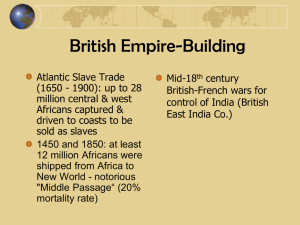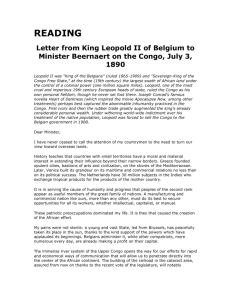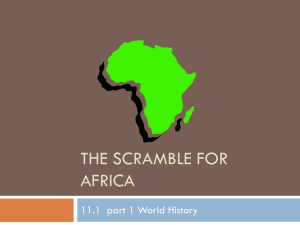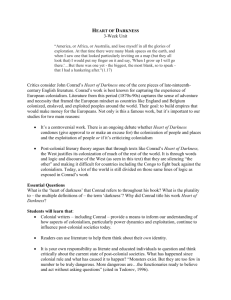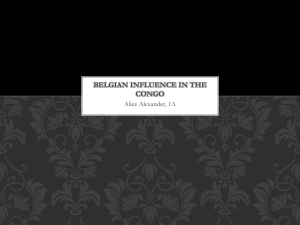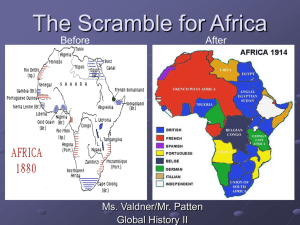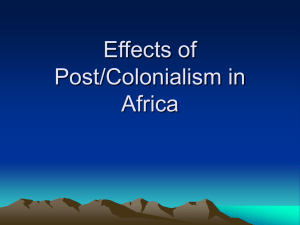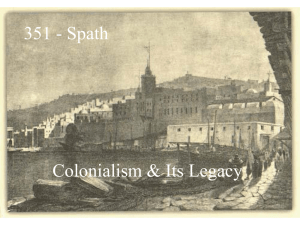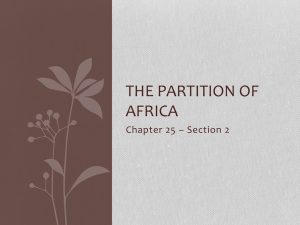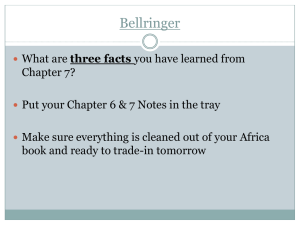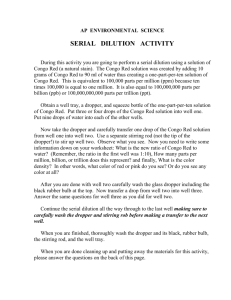Historical Background behind Heart of Darkness
advertisement
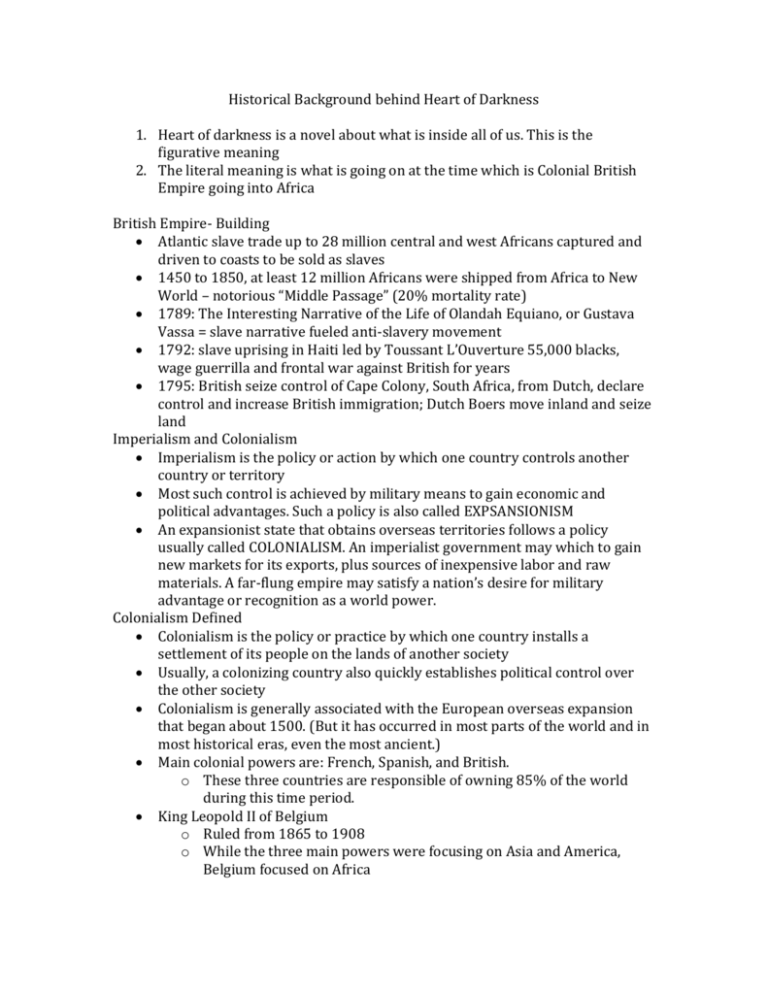
Historical Background behind Heart of Darkness 1. Heart of darkness is a novel about what is inside all of us. This is the figurative meaning 2. The literal meaning is what is going on at the time which is Colonial British Empire going into Africa British Empire- Building Atlantic slave trade up to 28 million central and west Africans captured and driven to coasts to be sold as slaves 1450 to 1850, at least 12 million Africans were shipped from Africa to New World – notorious “Middle Passage” (20% mortality rate) 1789: The Interesting Narrative of the Life of Olandah Equiano, or Gustava Vassa = slave narrative fueled anti-slavery movement 1792: slave uprising in Haiti led by Toussant L’Ouverture 55,000 blacks, wage guerrilla and frontal war against British for years 1795: British seize control of Cape Colony, South Africa, from Dutch, declare control and increase British immigration; Dutch Boers move inland and seize land Imperialism and Colonialism Imperialism is the policy or action by which one country controls another country or territory Most such control is achieved by military means to gain economic and political advantages. Such a policy is also called EXPSANSIONISM An expansionist state that obtains overseas territories follows a policy usually called COLONIALISM. An imperialist government may which to gain new markets for its exports, plus sources of inexpensive labor and raw materials. A far-flung empire may satisfy a nation’s desire for military advantage or recognition as a world power. Colonialism Defined Colonialism is the policy or practice by which one country installs a settlement of its people on the lands of another society Usually, a colonizing country also quickly establishes political control over the other society Colonialism is generally associated with the European overseas expansion that began about 1500. (But it has occurred in most parts of the world and in most historical eras, even the most ancient.) Main colonial powers are: French, Spanish, and British. o These three countries are responsible of owning 85% of the world during this time period. King Leopold II of Belgium o Ruled from 1865 to 1908 o While the three main powers were focusing on Asia and America, Belgium focused on Africa o King Leo commissioned the explorer Henry Stanley to secure agreements from the tribes who inhabited the Congo Basin in Africa (1879 – 84) Stanley did so through a combination of promises, threats, and trickery. The agreements allowed the Belgians into the Congo to take its rich natural resources. Ivory is the number one natural resource in Africa at the time. o At the Berlin Conference of 1884, the European powers met to carve up Africa. Leopold called Africa “that magnificent African cake.” From this beginning, the Congo Basin became the Congo Free State, 900,000 square miles, in essence the private estate of Leopold o A year later in another conference, Leopold was named sovereign over the Congo Free State. o The Congo River is the major setting for this entire novella o The Congo River becomes an archetypal river but also becomes a symbol for knowledge. Colonialism in Africa A racially based (or racist) system of political, economic, and cultural and domination forcibly imposed by a technologically superior foreign minority on an indigenous majority o It assumed that the nation state and an industrial capital economy were the most advanced forms of human organization o It assumed an innate moral inferiority on the part of Africans Because they are not Christians Not educated Not “civilized” (means not cultured to Europeans) Technologically inferior Dark colored skin (bad, beastly) o It depended on economic explanation and political oppression. o Religion made whites superior in the Congo Major themes of this novel BLACK AND WHITE LIGHT AND DARKNESS o White people are “bringers of light” where as black people “dwell in darkness” because they do not have the light of god, education, technology, etc. Colonialism in Africa 1800 – 1880: European exploration and trade with Africa by merchants, explorers, and missionaries 1880 – 1900: Partition and Scramble for Africa 1900 – 1920: Colonization and Colonial Rule 1950 – present: Post-colonial independence Heart of Darkness = Harrowing Critique of Western Colonialism 1899, 1902: Heart of Darkness exposes predatory European Colonialism and its atrocities Brussels = “Whited sepulchre”; hypocrisy of hollow ideals; “civilizing mission” and “White Man’s Burden” Public opinion turns against “jingoism” (e.g Rudyard Kipling) 1908: Leopold II loses Congo to Belgian government 1960: Belgian Congo achieves independence Modernism – General Definition: Broke up the logically developing plot typical of 19th century novel and offered unexpected connections or sudden changes in perspective An attempt to use language in a new way o To reconstruct the world of art as much as the philosophers and scientists had redefined the world of their own disciplines Played with shifting and contradictory appearances to suggest the shifting and uncertain nature of reality Used interior monologues and free association to express the rhythm of consciousness Made greater use of image clusters, thematic associations, and “musical” patterning to supply the basic structures of both fiction and poetry Drew attention to style instead of trying to make it “transparent” Blended fantasy with reality while representing real historical or psychological dilemmas Raised age-old questions of human identity in terms of contemporary philosophy and psychology. Frame Narrative The information of a frame narrative is not trustworthy because it is being told from person to person Modernism introduces this to question ourselves and to question what it is to be human Great way to challenge different ways of using language Early Modernism and Heart of Darkness Social breakdown, fragmentation: lose faith in progress, science, religion, politics, bourgeois morality (middle class morality) o Bourgeois morality is believing that you are better than you actually are and trying to get to a “better” place in life Alienation from urban bureaucratic society, a sterile, materialistic “waste land’ Question, challenge structures of human life – o Christianity was challenged as “convenient fictions” created to impose order, meaning on random, senseless, violent world Challenges for Readers Narrator/author suggests/evokes thoughts but does not explain; personal symbol system o Reader must figure out for themselves New, previously forbidden subjects o Things that were pretty jaded in society as it is. o DON’T BE ANACHRONISTIC o Story was specifically post-Victorian o Sex and violence not spoken about in public or mixed company Unsettle readers’ expectations; shock out of complacency Open-ended, ironic, multilayered, “inconclusive” Process/search/journey Experimental forms of Multiple “Realities” of Uncertainty Flow of consciousness and memory structures narrative: associative (vs. linear) “logic” intertwines present awareness and memory The “Contract” Between you and the author You have to suspend disbelief You have to agree that you will believe everything that is said in this story in order to fall into the story Nietzsche’s Ideology Distinction between the Dionysiac (instinctual) and the Apollonian (intellectual) forces in man, his insistence on the individual’s complete freedom (and responsibility) in a world that lacks transcendental law (“God is dead”), and his attack on the unimaginative mediocrity of mass society in the modern industrial world ID, EGO, and SUPEREGO Id: not an organized system but a chaos of primal energies that urges us to action (pleasure principle, immediate gratification) Ego: psychic system that operates on the reality principle and mediates between the blind energy drivers of the id and the real world restrictions. It is a negotiating instrument – negotiating effectively and realistically to meet our needs. *In a healthy individual the ego is in command. Superego: system of moral values acquired through interactions with the world.
